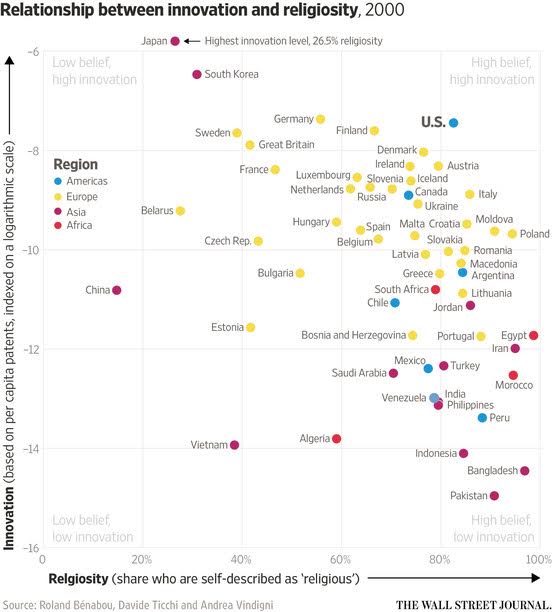
Source: Real Time Economics
Do Strong Religious Beliefs Stifle Innovation?
May 11, 2015 8:30pm by Barry Ritholtz
This content, which contains security-related opinions and/or information, is provided for informational purposes only and should not be relied upon in any manner as professional advice, or an endorsement of any practices, products or services. There can be no guarantees or assurances that the views expressed here will be applicable for any particular facts or circumstances, and should not be relied upon in any manner. You should consult your own advisers as to legal, business, tax, and other related matters concerning any investment. The commentary in this “post” (including any related blog, podcasts, videos, and social media) reflects the personal opinions, viewpoints, and analyses of the Ritholtz Wealth Management employees providing such comments, and should not be regarded the views of Ritholtz Wealth Management LLC. or its respective affiliates or as a description of advisory services provided by Ritholtz Wealth Management or performance returns of any Ritholtz Wealth Management Investments client. References to any securities or digital assets, or performance data, are for illustrative purposes only and do not constitute an investment recommendation or offer to provide investment advisory services. Charts and graphs provided within are for informational purposes solely and should not be relied upon when making any investment decision. Past performance is not indicative of future results. The content speaks only as of the date indicated. Any projections, estimates, forecasts, targets, prospects, and/or opinions expressed in these materials are subject to change without notice and may differ or be contrary to opinions expressed by others. The Compound Media, Inc., an affiliate of Ritholtz Wealth Management, receives payment from various entities for advertisements in affiliated podcasts, blogs and emails. Inclusion of such advertisements does not constitute or imply endorsement, sponsorship or recommendation thereof, or any affiliation therewith, by the Content Creator or by Ritholtz Wealth Management or any of its employees. Investments in securities involve the risk of loss. For additional advertisement disclaimers see here: https://www.ritholtzwealth.com/advertising-disclaimers Please see disclosures here: https://ritholtzwealth.com/blog-disclosures/
What's been said:
Discussions found on the web:Previous Post
Who benefits from a higher minimum wage?Next Post
Stocks, Profits, GDP

Freedom to think is the key. There have been periods in history where very religious people came up with incredible insights, but they were free to think. Relatively atheistic cultures that are totalitarian with little opportunity for creative thought can be stifling to innovation (North Korea). The Inquisition was more an exercise in thought control than religion more akin to North Korea totalitarianism than the religiosity of Thomas Jefferson and Benjamin Franklin.
The median American or Canadian will plot as being quite religious, however it could be any one of dozens of religions. In many countries they would be suppressed because it was the wrong religion. Here they are (generally) free to believe, discuss, and innovate. The separation of Church and State inherent in the First Amendment is absolutely critical to maintaining innovation.
If they treated restrictive politics (e.g., communism, fascism) as a religion, they might have an even more interesting chart. That is, more dogmatic beliefs vs. innovative.
What a meaningless comparison. Innovation is not a single metric e.g. patents per capita nor is self-described “religiosity” equivalent to close-mindedness.
see:
http://www.oecd.org/site/innovationstrategy/measuringinnovationanewperspective-onlineversion.htm